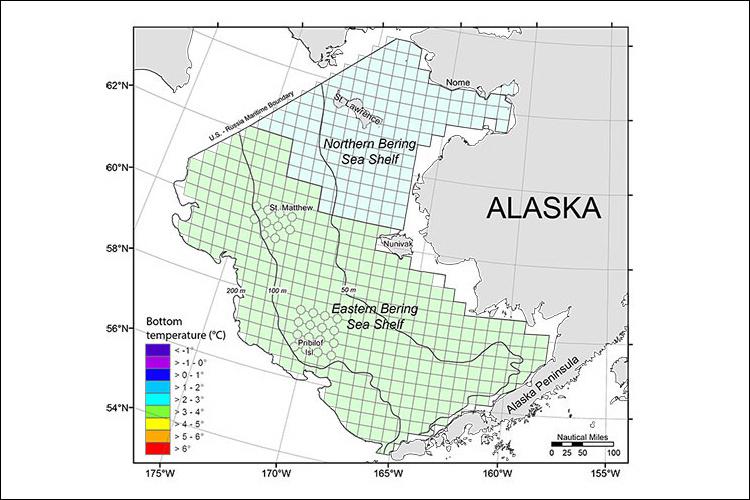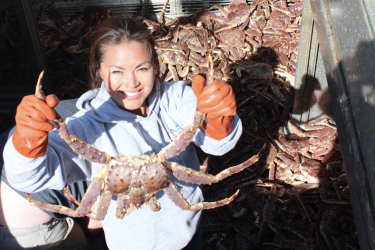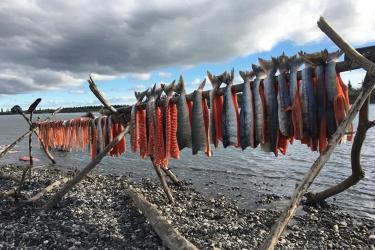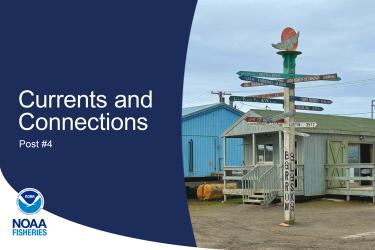The map shows the sampling grid for the 2017 eastern and northern Bering Sea shelf bottom trawl survey (June 1 and August 30, 2017). The map will be updated several times each week to show the progress of the survey vessels and the bottom temperature (℃) in each 20 x 20 nautical mile grid cell.
For nearly four decades, NOAA Fisheries has been conducting annual bottom trawl surveys of the eastern Bering Sea continental shelf. We collect information on the status and trends of commercially important fish, crabs and other species including walleye pollock, Pacific cod, Greenland turbot, yellowfin sole, northern rock sole, red king crab, snow, and Tanner crabs. Other information collected during the survey enables us to gain further insights into the behavior, diets and life span of these marine animals along with the ecological and physical factors that affect their distribution and abundance. Having long term information for such a broad area is very useful for studying changes in the community of marine animals over time. These surveys are key to conserving and managing our nation’s living marine resources. Scientists are conducting the survey from two commercial fishing vessels – FVs Alaska Knight and Vesteraalen. For only the second time since 2010, the study will be expanded to include the entire northern Bering Sea shelf. We will be collaborating with scientists from the Alaska Department of Fish and Game, United States Coast Guard Academy, Oregon State University, International Pacific Halibut Commission, University of Washington, the Norton Sound Economic Development Corporation, and NOAA Fisheries’ Northeast Fisheries Science Center.
Meet the Bloggers

Bob Lauth
Bob Lauth has been a Fisheries Research Biologist for the NOAA Alaska Fisheries Science Center in Seattle for 26 years. Bob leads the Bering Sea Group, which is responsible for conducting summertime surveys of bottom fish, crabs, and other bottom-dwelling creatures in the offshore marine waters of Alaska. Fascinated by Jacques Cousteau as a kid, Bob moved from Chicago to the 'ever-green' Seattle in 1980 to become a marine biologist without the slightest idea how to earn a living. After working three years in a dive store, teaching scuba diving, and doing marine field trips with school kids in the Puget Sound, Bob learned about the 'fishy side’ to marine biology. He enrolled at the University of Washington School of Fisheries, earned a Master’s degree, and then worked for the Inter-American Tropical Tuna Commission at a remote marine lab in Central America before returning to the northwest with his wife to raise a family and pursue his career in fisheries.

Jason Conner
Jason Conner is a fishery biologist who researches the groundfish populations of the Bering Sea. He began his career with NOAA Fisheries in Woods Hole, MA, at the Northeast Fisheries Science Center, helping to record data on whale and seal populations in the Atlantic. He also spent two years in Gloucester, MA, working on fisheries data reporting systems for the Northeast Regional Office. Jason grew up in Denver, CO, but he has had a passion for the ocean since he was two years old. In his free time, Jason enjoys acting in community theater, playing ice hockey, and diving (with and without SCUBA).



